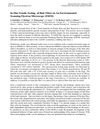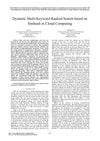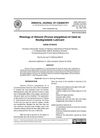29 citations,
April 2000 in “Journal of histochemistry and cytochemistry/The journal of histochemistry and cytochemistry” ICAM-1 helps regulate hair growth cycles and skin remodeling.
 6 citations,
July 2019 in “Experimental Dermatology”
6 citations,
July 2019 in “Experimental Dermatology” Skin can produce blood cells, often due to disease, which might lead to new treatments for skin and blood conditions.
54 citations,
May 2021 in “Chemical Engineering Journal” The developed scaffold effectively treats chronic wounds by promoting healing and preventing infection.
 7 citations,
January 2022 in “Molecules”
7 citations,
January 2022 in “Molecules” Tectoridin helps human hair cells grow and makes mouse hair longer, suggesting it could treat hair loss.
 25 citations,
January 2010 in “International Journal of Pharmaceutics”
25 citations,
January 2010 in “International Journal of Pharmaceutics” Particle properties affect drug retention and release in minoxidil foams, with lipid nanoparticles having higher loading capacity.

Wound healing involves three phases and various cells and factors, with scars typically forming in adults. Chronic wounds can occur due to various issues, and abnormal scarring can lead to hypertrophic or keloid scars. Emerging research areas include the role of proteins, microRNAs, macrophage manipulation, and stem cell treatment.
 September 2020 in “Faculty Opinions – Post-Publication Peer Review of the Biomedical Literature”
September 2020 in “Faculty Opinions – Post-Publication Peer Review of the Biomedical Literature” Lymphatic vessels and hair follicles interact and may influence hair growth.
 21 citations,
November 2011 in “The journal of investigative dermatology/Journal of investigative dermatology”
21 citations,
November 2011 in “The journal of investigative dermatology/Journal of investigative dermatology” Telogen is an active phase with important biological processes, not a resting phase.
 August 2007 in “Microscopy and Microanalysis”
August 2007 in “Microscopy and Microanalysis” Hair fibers break by cuticle cell slipping, shape changing, cuticle fraying, and surface cracking when stretched under specific conditions.
 19 citations,
April 2019 in “Journal of the European Academy of Dermatology and Venereology”
19 citations,
April 2019 in “Journal of the European Academy of Dermatology and Venereology” Acne lesions start with changes in hair follicles and increase in inflammation, suggesting a cycle that could affect treatment strategies.
1 citations,
April 2023 in “Scientific Reports” Self-assembling RADA16-I hydrogels with bioactive peptides significantly improve wound healing.
 April 2019 in “Journal of Investigative Dermatology”
April 2019 in “Journal of Investigative Dermatology” The search scheme SMRI is faster and more secure for retrieving encrypted data from the cloud.
83 citations,
September 2021 in “Advanced functional materials” The DNA hydrogel helps heal diabetic wounds by absorbing fluids, warming, sticking to tissue, killing bacteria, and aiding tissue and hair regrowth.
 45 citations,
April 2019 in “International Immunology”
45 citations,
April 2019 in “International Immunology” The study concluded that immune cells attacking hair follicles cause hair loss in alopecia, with genetics and environment also playing a role, and highlighted the potential of certain treatments.
 61 citations,
December 2016 in “The EMBO Journal”
61 citations,
December 2016 in “The EMBO Journal” The study showed that hair follicle stem cells can maintain and organize themselves in a lab setting, keeping their ability to renew and form hair and skin.
October 2015 in “CRC Press eBooks” Hair cloning for hair loss is not yet a practical solution.
 October 2023 in “Oriental Journal of Chemistry/Oriental journal of chemistry”
October 2023 in “Oriental Journal of Chemistry/Oriental journal of chemistry” Almond oil works well as a biodegradable lubricant and has health benefits.

Sensory neurons and Merkel cells remodel at different rates during normal skin maintenance.

Sensory neuron and Merkel cell changes in the skin happen independently during normal skin maintenance.
5 citations,
May 2021 in “EMBO journal” Cell polarity signaling controls tissue mechanics and cell fate, with complex interactions and varying pathways across species.
 64 citations,
August 2013 in “Mayo Clinic Proceedings”
64 citations,
August 2013 in “Mayo Clinic Proceedings” Wound healing insights can improve regenerative medicine.
 April 2023 in “The journal of investigative dermatology/Journal of investigative dermatology”
April 2023 in “The journal of investigative dermatology/Journal of investigative dermatology” Developing hair follicles form from ring-shaped patterns, with future stem cells originating from the outer ring, not the upper layers, as previously thought.
38 citations,
November 2020 in “International journal of biochemistry & cell biology” Keratin proteins are essential for keeping the cells in the human colon healthy and stable.
 7 citations,
January 2016 in “Methods in molecular biology”
7 citations,
January 2016 in “Methods in molecular biology” Mouse hair follicle stem cells were successfully isolated and used to regenerate hair follicles with two different methods.
 3 citations,
January 2016 in “International Journal of Trichology”
3 citations,
January 2016 in “International Journal of Trichology” Sheep-derived factors improve human hair cell clustering, which may help hair growth.
 480 citations,
August 2014 in “Nature Biotechnology”
480 citations,
August 2014 in “Nature Biotechnology” Changing the environment around stem cells could help tissue repair, but it's hard to be precise and avoid side effects.
 June 2023 in “Food frontiers”
June 2023 in “Food frontiers” Ginsenoside CK, found in Panax ginseng, can prevent hair loss by controlling certain growth pathways and promoting hair follicle development.
 5 citations,
January 2014 in “International journal of gynaecology and obstetrics”
5 citations,
January 2014 in “International journal of gynaecology and obstetrics” HIV-positive pregnant women are more likely to experience severe bleeding, and a pregnant woman with familial hypertriglyceridemia had a successful early delivery with special care.
 April 2023 in “IntechOpen eBooks”
April 2023 in “IntechOpen eBooks” Drug repurposing speeds up drug development, saves money, and has led to about a third of new drug approvals.
October 2019 in “CRC Press eBooks” Retinoids can both cause and treat different hair disorders.





















